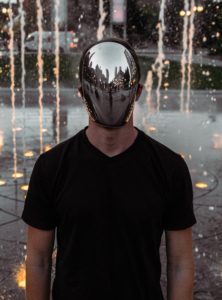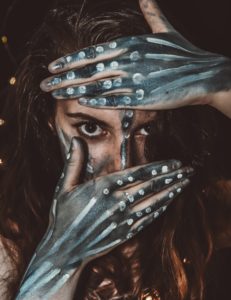I recently came across a haunting question in my newsfeed:
Without a public eye, who are we?
Wow.
This single question encompasses much of my uneasiness around social media and identity politics.
I don’t believe the public eye is capable of defining who we are. It certainly can’t define who I am. The public eye does not make us real.
All the public eye can know about me is what I choose to show or tell about myself. The rest is a game of let’s pretend. Much of what the public eye sees, both on social media and in real life, is a carefully crafted pseudo self, a false façade behind which a real person hides.
I’ve just finished a book called Controlling People: How to Recognize, Understand, and Deal with People Who Try to Control You, by Patricia Evans. It’s taken me a long time to get through it; it was such an intense experience I could only read a little at a time.
I’ve learned, thought and written a great deal about power and control, as regular readers know. I would have said I didn’t have much more to learn.
I would have been wrong.
I’ve never come across such a cogent and compassionate explanation for why so many people try to control others. I’m no longer a victim of controlling people, because I recognize the pattern and refuse to engage with it, but understanding why we develop the often unconscious and always toxic compulsion to control those we care about most is useful. It reinforces the fact that the need others have to control me is not about me – it’s about them. Understanding also helps me engage others with compassion and dignity.
Controlling people are like the public eye. They pretend they can define us, that they know our thoughts and feelings and our motivations. They apply labels to us. They tell us who we must be and who we cannot be. If we are noncompliant with their expectations and fantasies, they bring us to heel through tribal shaming, scapegoating, deplatforming, silencing, and other abusive tactics. Sometimes they kill us.
The biggest threat for a controlling person is an authentic person. When we insist on being ourselves, with our own preferences, thoughts, needs, and feelings, the controller feels as though they are losing control, and thus losing themselves.
This is why saying ‘no’ can result in such violent reactions.
If our sense of self depends solely on the public eye, or a controller, or a pseudo self, or a label, or a role or job, we’re in trouble.
When my sons decided to go live with their dad in the big city in their mid-teens, I fell apart. My sense of self dissolved. If I was not their mother, who was I?
I had no idea. It was a horrible feeling. I’d been a single, struggling mom for so many years I had no other identity, nothing private, no connection to my own soul.
For weeks I got out of bed in the middle of the night, opened their bedroom doors and stood in the dark, silent house, looking into their empty rooms, grieving and utterly lost. For a time, I didn’t know how to go on living.
It passed, of course, as times like that do. It was simply rebirth, or rather, birth. Before the kids I’d been a wife, and before that a daughter and sister, and those roles, too, absorbed me utterly. When the kids moved out, I finally began to make friends with the stranger who was me. Not a role. Not a job. Not a people-pleasing pseudo self. Not a label.
Just me.
I’ve never forgotten the pain of that time, the dislocation, the feeling of being erased. I didn’t know it then, but it was the beginning of everything – dance, storytelling, writing, healing, and growing.
It was the beginning of breaking away from the control of others and the ‘public eye’.
The public eye is merciless. It makes snap judgements. It’s critical and abusive. It has expectations. It makes up a story about us and calls it truth. It punishes those of us who dare to be authentic, thoughtful, complex, unexpected, or independent.
We are not paper dolls. We are not entertainment. We are not mere reflections in any eye, public or otherwise. We pretend what others say, perceive, and think about us is the ultimate truth of our identity; we give that game of pretend enormous power. We pretend we can define others from their dating profile, Facebook activity, or outward appearance and presentation.
No. Our true identity does not depend on the public eye. Nobody was erased during lockdown or quarantine. Those of us not on social media are real people leading real lives. Introverts or extroverts, lounging in our sweats with bed head at home or sleek and groomed out on the town, we are an authentic person, even if we reject that person utterly, or have never known them.
True identity is built from the inside out, not the outside in.
With or without a public eye, we are ourselves.
© 2021 – 2023, Jenny Rose. All rights reserved.


